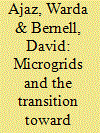|
|
|
Sort Order |
|
|
|
Items / Page
|
|
|
|
|
|
|
| Srl | Item |
| 1 |
ID:
171392


|
|
|
|
|
| Summary/Abstract |
Increasing distributed renewable energy generation renders balancing of energy supply and demand more challenging. Peer-to-peer (P2P) exchange of decentrally generated energy is a promising means to optimize renewable energy flows. While previous research has primarily focused on the technological and economic benefits of P2P energy trading, little research has investigated customer preferences in this context so far. It is thus still unclear to what extent private actors such as homeowners are actually willing to participate in P2P energy communities and if so, under which conditions. Here, we address this research gap by analyzing homeowners' trading decisions in simulated P2P electricity trading scenarios. Findings based on a sample of 301 German homeowners show that community electricity prices and state of charge of private energy storages are key determinants of homeowners’ trading behavior. We moreover identified four target groups that systematically differed in their decision-making strategies ranging from price-focused prosumers (38.9%) to classic non-trading consumers (22.6%). Our findings provide promising insights for the design of P2P communities and allow policy makers to more accurately predict risks and benefits associated with P2P projects. Finally, our findings contribute to the development of tailored policy instruments aiming to increase P2P trading in decentralized energy communities.
|
|
|
|
|
|
|
|
|
|
|
|
|
|
|
|
| 2 |
ID:
166485


|
|
|
|
|
| Summary/Abstract |
Rural electrification project plans (REPP) aim to expand electricity access through adequate systems for communities without this service in developing countries. Many REPP have been developed, using different strategies in terms of energy uses covered, energy resources, electricity distribution and management models. This paper aims to analyze and compare REPP strategies. To do so, an evaluation methodology is developed, using a novel three-level assessment approach: the general definition at regional scale, the technical design at local scale, and the operation and maintenance (O&M) management. More specifically, ad hoc criteria are defined at each level to examine REPP fulfilment through quantitative and qualitative indicators. As case study, three plans from Chiapas (Mexico) are evaluated: national grid extension with national O&M; individual photovoltaic systems with regional O&M; and wind-photovoltaic microgrids with local O&M. Thus, the strengths and limitations of each REPP are identified in terms of strategies at regional scale, local scale and management model. Results show the ability of large plans to provide electricity to many families, while small plans may be adapted to the specific needs of end-users. The proposed criteria and indicators can be easily adjusted to evaluate REPP in different contexts to strengthen future plan strategies.
|
|
|
|
|
|
|
|
|
|
|
|
|
|
|
|
| 3 |
ID:
128350


|
|
|
|
|
| Publication |
2014.
|
| Summary/Abstract |
Microgrids can provide an avenue for increasing the amount of distributed generation (DG) and delivery of electricity, where control is more dispersed and quality of service is locally tailored to end-use requirements, with applications from military bases to campuses to commercial office buildings. Many studies have been done to date on microgrid technology and operations, but fewer studies exist on demonstration programs and commercial microgrid development. As China prepares to launch the largest microgrid demonstration program in the world, we review progress made by demonstration programs across Europe, Asia, and the Americas as well as microgrid benefits and barriers. Through case studies, we highlight the difference in experience for microgrids developed under the auspices of a government-sponsored demonstration program versus those that were commercially developed. Lastly, we provide recommendations oriented towards creating a successful microgrid demonstration program.
|
|
|
|
|
|
|
|
|
|
|
|
|
|
|
|
| 4 |
ID:
190609


|
|
|
|
|
| Summary/Abstract |
Microgrids are decentralised electricity systems that can operate independently of the main electricity network, and which have the potential to contribute to the energy transition towards a more sustainable energy mix. However, the integration of the system in the EU electricity market is not regulated and the resulting uncertainty discourages the system's development. This article provides the first step towards increased legal certainty for microgrid users and initiators by developing a regulatory approach based on three different microgrid ownership and operation models. If the existing rules in EU energy law allow for some flexibility to include electricity household consumers under the provisions of Closed Distribution Systems and allow for Citizens Energy Communities to manage part of the distribution system, the legal framework does offer possibilities to regulate microgrids. Nevertheless, many legal questions remain, in particular regarding responsibilities of active customers, consumption management, and regulation of flexibility services. In addition, the regulatory approach towards microgrids depends on EU Member States granting energy communities the right to manage part of the distribution network, which now depends on the discretion of the Member States. This discretionary nature should be reconsidered given the significant potential for local initiatives to contribute to the energy transition.
|
|
|
|
|
|
|
|
|
|
|
|
|
|
|
|
| 5 |
ID:
177387


|
|
|
|
|
| Summary/Abstract |
The increasing penetration of microgrids in appears to be part of a transition toward electricity distribution systems that are more decentralized than the current system. With microgrids gaining space as a competing and parallel distribution grid model and challenging the current centralized grid system, studying their adoption presents an opportunity to understand this socio-technical transition in the energy system. This study looks at this ongoing change in the United States and applies the Multi-Level Perspective framework to explore the drivers, contexts, processes, policies, institutions, and interactions that affect the adoption of microgrids. Through a qualitative case study analysis of California, New York, and Oregon, the study finds that natural disasters, massive power outages and climate change concerns have acted as key pressures for the adoption of microgrids. At the same time, the electric power system maintains important stabilization mechanisms, such as the availability of cheap and abundant electricity, as well a market structure that limits the opportunities of entry and profit for third-party developers, which make it harder for niche innovations like microgrids to break in. In addition, this study finds that state support in the form of funding and legislation is crucial for nurturing the microgrid niche market.
|
|
|
|
|
|
|
|
|
|
|
|
|
|
|
|
| 6 |
ID:
180112


|
|
|
|
|
| Summary/Abstract |
Given the important role that electricity plays in powering society, and the significant risk that extreme weather and other events pose in disrupting electricity supply, the idea of community-scale microgrids has come to the forefront to enhance electrical grid resiliency and provide critical services to local communities during extended outages. In this paper, a discrete choice experiment is used to evaluate willingness to pay (WTP) for services provided by a community microgrid during extended power outages. With a sample of 939 respondents from New York State, results indicate that, overall, there is a positive willingness to pay for microgrid services, including hospital and emergency services, potable water, shelters, and retail outlets; even if residents are not receiving their own residential electricity supply during an outage. The average willingness to pay for the full suite of evaluated microgrid services is approximately $14 per month per household. We also find that WTP varies with some sociodemographic and other characteristics. These results provide critical evidence for rate-makers and utilities in evaluating societal benefit when making investment decisions for microgrids and related infrastructure.
|
|
|
|
|
|
|
|
|
|
|
|
|
|
|
|
|
|
|
|
|